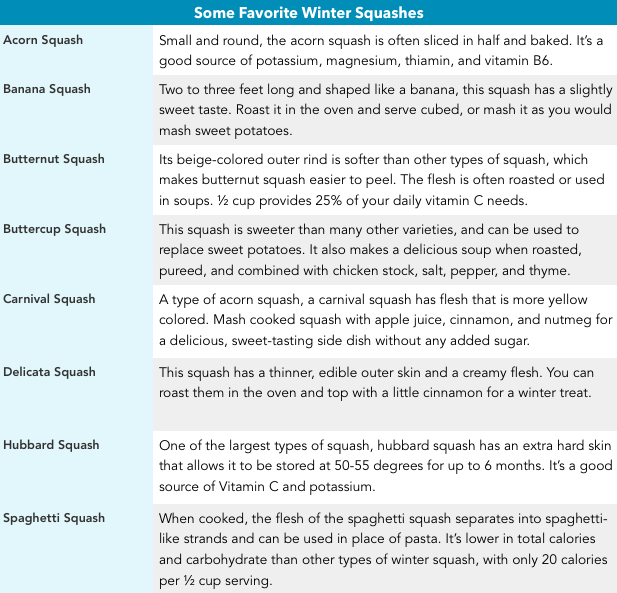Winter Squash: Nutrient Powerhouse
Both summer and winter squash are available year-round, but in the depths of winter, it feels good to turn on the oven and roast some squash or make it into a delicious, smooth-textured soup. There are several different varieties of winter squash, and what they all have in common is an inedible, hard outer rind and large seeds. Most winter squash have orange-colored flesh, which means that they’re an especially rich source of vitamin A and beta-carotene, antioxidants that play an important role in healthy bones, vision, and a great immune system. ½ cup serving of winter squash on average contains 38 calories, 9 grams carbohydrate, 3 grams fiber, less than 1 gram fat and 1 gram protein. Nutrition facts:
Nutrition facts:
- ½ cup serving of winter squash on average contains 38 calories, 9 grams carbohydrate, 3 grams fiber, <1 gram fat and 1 gram protein.
- Winter squash is considered a starchy vegetable because it contains 2-3 times the amount of carbohydrate as other, non-starchy vegetables. Each week aim to include 4-6 cups of starchy vegetables including potatoes, sweet potatoes, corn, peas, and of course winter squash in your food choices.
- All types of winter squash are high in antioxidants, including carotenoids, that help reduce inflammation that is a factor in many chronic diseases including cardiovascular disease and some types of cancer.
- ½ cup serving of winter squash provides about 100% of your daily vitamin A needs. Winter squash is also a good source of vitamin C.
- While winter squash is a low-fat food, the type of fat it contains is high in ALA, a plant version of omega-3 fatty acids that are important for health.
Purchasing tips:
- Look for winter squash that are heavy and firm for their size
- Choose winter squash with hard, dull (not glossy) rinds
- Pick up winter squash with no signs of mold or softness on the rind
How to store winter squash:
- Optimally, store your squash away from direct sunlight at 50-60 degrees temperature.
- Once cut, store the unused portion of winter squash wrapped in plastic wrap in the refrigerator for 1-2 days.
- To freeze, remove the outer rind and cut into smaller pieces to use in recipes.
- Cooked squash can be kept in the refrigerator for 2-3 days, or freeze for later use.
References:
- What’s Cooking America? Types of Squash – Summer and Winter Squash. https://whatscookingamerica.net/squash.htm Accessed 10-27-17.
- The World’s Healthiest Foods. Squash, winter. http://www.whfoods.com/genpage.php?tname=foodspice&dbid=63 Accessed 10-27-17.
- USDA. Choose My Plate. All About the Vegetable Group. https://www.choosemyplate.gov/vegetables Accessed 10-28-17
- Nutrition Data. Spaghetti squash. http://nutritiondata.self.com/facts/vegetables-and-vegetable-products/2655/2 Accessed 10-29-17
By Lynn Grieger, RDN, CDE, CPT, CHWCPDF Handout: Winter Squash Handout


